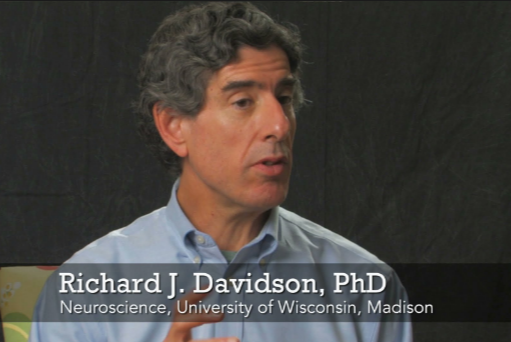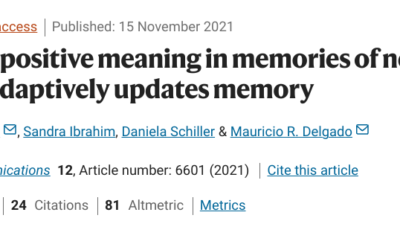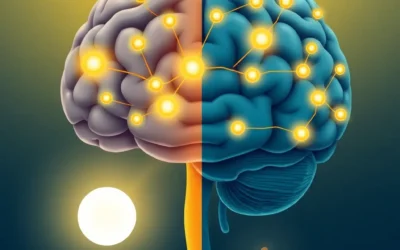 "I began with most of my focus on the negative side of things and then when I met the Dalai Lama in 1992, he asked me, 'why have you been using the tools of modern neuroscience just to study anxiety and stress and fear and depression?
"I began with most of my focus on the negative side of things and then when I met the Dalai Lama in 1992, he asked me, 'why have you been using the tools of modern neuroscience just to study anxiety and stress and fear and depression?
Why not use those same tools to study kindness and compassion?'
That was like the total wake-up call for me and it is in fact what we've been doing since that critical moment. One of the first ways in which we decided to begin something that his holiness encouraged us to do, which is to test individuals who spent years training their mind. These people have spent on average about 34,000 hours of lifetime practice.
In that particular experiment we were looking for signs in brain electrical signals. Whether those signals when individuals are actually meditating showed anything unusual and what we found was remarkable.
Gamma is a brain rhythm that is occurring at roughly 40 cycles per second and in the brains of advanced Tibetan meditators we found the presence of these gamma oscillations that went on for tens of minutes and they're very high input to the brains were also significantly different and these differences reflect the enduring traces if you will and it gives us some clue that in fact the baseline state of these individuals is transformed as a consequence of their practice.
Here we talk about healthy minds and well-being as skills and all of this scientific research is leading inevitably to this conclusion: these simple ancient practices that were developed 2,500 years ago are now being tracked with instruments that have just become available in human history for the first time.
We use Mri to analyze the structure of the brain, the function of the brain. You can actually see changes in subtle blood flow to different regions of the brain.
So there is undeniable evidence that practices to cultivate well being influence the functioning of the brain.
Most of the time our brains are being shaped unwillingly.
The invitation in all this work is that we can actually take more responsibility for the shaping of our own brains by engaging in healthy habits of mind.
One of the important constituents of well-being we call resilience. We can actually track the brain circuits that are responsible for this. We have shown that we can actually influence these circuits with training.
We can take someone who is not resilient and improve their resilience. And they actually show improvements in their well being."
I think that one of the important insights from our work is that the mind can be transformed. That we all are born with a capability for change and that the seeds of living a life that is compassionate, that is kind, generous, is within each of us.
If we all believe that, I'm absolutely convinced the world would be a much better and happier place.
- Richie Davidson, Neuroscientist, Pioneers series by Huffington Post
How to Reduce Bad Memories and Improve Your Well-Being
In this post we will do an overview of a study to understand how to reduce bad memories and improve your well-being. If you've been haunted by negative autobiographical memories of high personal significance and arousal, understand how that can induce a stronger sense...
Career Opportunities for People with Mild Autism: A Comprehensive Guide
Autism Spectrum Disorder (ASD) is a neurodevelopmental condition that affects individuals in various ways. While autism can present challenges, it also comes with unique strengths that can be valuable in many career paths. This article focuses on career opportunities...
How the Oura Ring Revolutionizes Sleep Tracking Compared to Other Fitness Trackers
In the ever-evolving world of wearable technology, the Oura Ring Revolutionizes Sleep Tracking and here is why. This sleek, unobtrusive device is redefining how we monitor our health and wellness, offering a level of insight that many traditional fitness trackers...
Summary of RTM Protocol in Erasing PTSD in under Five Hours
Having traumatic memories can last for years, but fortunately some are able to be erasing PTSD with a natural mechanism in the brain fro rewriting memories. This process is known as memory reconsolidation and in this post is a review of a case study where a Vietnam...
Review of Reconsolidation Behavioral Updating of Human Emotional Memory
Comprehensive review of, "Reconsolidation Behavioral Updating of Human Emotional Memory," by Bruce Ecker, examines 20 successful and 14 unsuccessful studies on behavioural updating of emotional memories. This post focuses on identifying causes of replication failures...
A 15-Minute Hypnosis Script for Adults with Mild Autism: Cultivating Calm and Connection
Many adults on the autism spectrum experience challenges with social interaction, emotional regulation, and sensory sensitivities. While professional therapeutic intervention is crucial, self-hypnosis can be a valuable complementary tool for managing these...



















